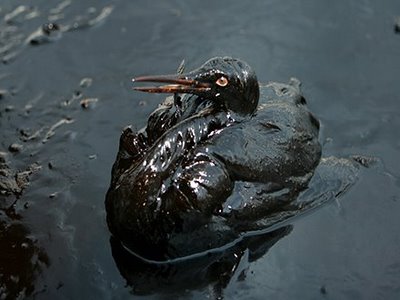Obama, the BP oil leak, and the doomsday scenario

Excerpts from an open letter by John Napier, CEO of British insurance company RSA, to President Obama:
“Please forgive this open letter but your comments towards BP and its CEO as reported here are coming across as somewhat prejudicial and personal. There is a sense here that these attacks are being made because BP is British.
If you compare the damage inflicted on the economies of the western world by polluted securities from the irresponsible, unchecked greed and avarice of leading USA international banks, there has not been the same personalised response in or from countries beyond the US. Perhaps a case of double standards?"
He does have a point and Obama has declared he is not anti-British. However, perhaps it's not so much because BP is British though but rather because they aren't American. Contrast, if you will, Obama's approach to loose cannon Tony Hayward, CEO of BP vs. the equally annoying (but in a different way) Lloyd Blankfein, CEO of Goldman. Obama has been slamming Hayward steadily but has been mostly silent about Blankfein, even when Blankfein said Goldman was "doing God's work," and even when Obama called a summit of banker CEOs at the White House and Blankfein and two others said they couldn't make it because it was too foggy and, darn it, their private jets couldn't take off.
Obama thanked them for calling in by phone. (By contrast, I’m guessing LBJ would have had them screaming for mercy, had they pulled a stunt like that.) Should Hayward be a no-show at this Wednesday's White House meeting, I expect Obama's response might be a tad more assertive.
Another thing that is rightfully annoying the Brits is senior members of the White House referring to BP as "British Petroleum," a name they haven't used since 1998. So why call them that?
Sure, Napier is in part talking his own book, as RSA may well be facing huge insurance losses due to the BP leak. But his open letter is outspoken and highly unusual, and he's hardly the only major personage in Britain responding this way, even as their new Prime Minister refuses to publicly back BP.
BP is a huge corporation. Many Brits rely on BP stock dividends for income. But dividends for this quarter may well be eliminated. Is BP "Too Big To Fail"? Probably. But Britain is already facing huge budget problems, and propping up BP financially is about the last thing they want to do. Yet BP is now facing tens of billions in potential damages.
Matt Simmons, one of the more fascinating figures in all this, opines that BP will file bankruptcy, and soon. He's the retired founder of Simmons and Co., a major investment bank to the energy industry and an early proponent of the Peak Oil theory. Not only does he see immediate bankruptcy for BP, he's been saying the amount of oil in the Gulf is way more than what's coming out of the Deepwater blowout, so there must be other ruptures in the sea floor too. Further he says the government should take over from BP, send in supertankers to start sucking up the oil plumes, and consider dropping a nuke down the wellhead to seal it, something the Russians say they have done successfully to seal blowouts.
Rumors are that Simmons and Co. is telling clients to buy BP and ignore what Matt Simmons is saying. He is definitely controversial, often early with predictions, and sometimes wrong. But what he says about the size of the spill and the probability of other ruptures seems quite accurate. As for nuking the wellhead, might that not create radioactive oil and quite possibly new ruptures in the sea floor?
But his real point is that the leaks are so large that the situation is becoming catastrophic and thus extreme measures may be needed to stop it. As for the proposed final solution, relief wells are not easy to drill and often take months longer to work than originally thought. And of course, if there are other ruptures, the relief wells won't help much at all.
Another big fear is a hurricane hitting the Gulf while oil is in the water. Incidentally, Simmons says don’t call it a leak because it’s not. What happened at Deepwater was a blowout, the uncontrolled release of oil and gas from a wellhead.
Unfortunately, multiple reliable sources including BP officials are saying that the well-casing beneath the sea floor has been damaged and that oil and gas are gushing out through the cracks. This confirms what Simmons has been saying and also accounts for why "Top Hat" failed. The mud was going out the broken casing and not down the well.
If so, relief wells won’t help much. “If the relief wells do not result in stopping the flow, the next and drastic step is to implode the well on top of itself, which carries other risks as well,” says retired Shell Oil president John Hofmeister in what some call the doomsday scenario.
I have friends who are real estate agents on the Florida Panhandle. Their area was just beginning to recover from the real estate crash when the blowout happened. The coming collapse in tourism there will seriously impact them and their entire community. Multiply that by the entire region and you get an idea of the economic devastation which could be coming.
Let’s hope they seal the ruptures before it’s too late.




